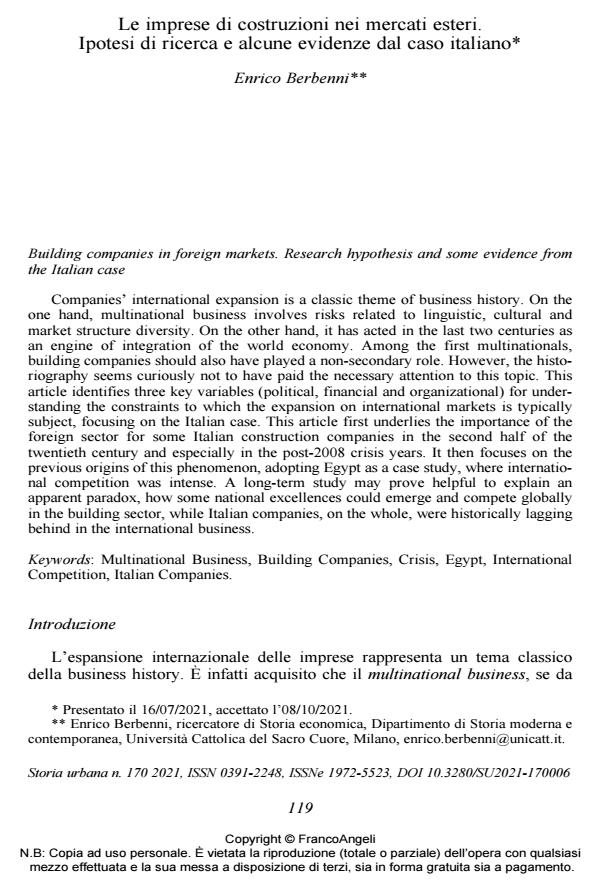Building companies in foreign markets. Research hypothesis and some evidence from the Italian case
Journal title STORIA URBANA
Author/s Enrico Berbenni
Publishing Year 2021 Issue 2021/170
Language Italian Pages 17 P. 119-135 File size 161 KB
DOI 10.3280/SU2021-170006
DOI is like a bar code for intellectual property: to have more infomation
click here
Below, you can see the article first page
If you want to buy this article in PDF format, you can do it, following the instructions to buy download credits

FrancoAngeli is member of Publishers International Linking Association, Inc (PILA), a not-for-profit association which run the CrossRef service enabling links to and from online scholarly content.
Companies’ international expansion is a classic theme of business history. On the one hand, multinational business involves risks related to linguistic, cultural and market structure diversity. On the other hand, it has acted in the last two centuries as an engine of integration of the world economy. Among the first multinationals, building companies should also have played a nonsecondary role. However, the historiography seems curiously not to have paid the necessary attention to this topic. This article identifies three key variables (political, financial and organizational) for under- standing the constraints to which the expansion on international markets is typically subject, focusing on the Italian case. This article first underlies the importance of the foreign sector for some Italian construction companies in the second half of the twentieth century and especially in the post-2008 crisis years. It then focuses on the previous origins of this phenomenon, adopting Egypt as a case study, where international competition was intense. A longterm study may prove helpful to explain an apparent paradox, how some national excellences could emerge and compete globally in the building sector, while Italian companies, on the whole, were historically lagging behind in the international business.
L’espansione internazionale delle imprese rappresenta un tema classico della bu siness history. Se da un lato il multinational business comporta dei rischi legati a di- versità linguistiche, culturali e di strutture di mercato, dall’altro esso ha agito negli ultimi due secoli come un motore di integrazione dell’economia mondiale. Tra le pri- me multinazionali non dovevano mancare le imprese di costruzioni, a cui però la sto- riografia sembra curiosamente non aver dedicato la necessaria attenzione. Questo ar- ticolo individua tre variabili (politica, finanziaria e organizzativa) che risultano fon- damentali per comprendere i vincoli cui è tipicamente soggetta l’espansione sui mer- cati internazionali, con particolare riferimento al caso italiano. Dopo aver sottolinea- to l’importanza del settore estero per alcune edilizie italiane nella seconda metà del Novecento e soprattutto negli anni di crisi post-2008, l’analisi si sofferma sulle pre- cedenti origini di questo fenomeno, adottando come caso di studio quello dell’Egitto, dove la concorrenza internazionale fu particolarmente forte. Uno sguardo di lungo periodo, infatti, può rivelarsi utile per spiegare un apparente paradosso, ossia come sia stato possibile l’emergere di alcune eccellenze in grado di competere con succes- so nei mercati globali, nonostante lo storico ritardo accumulato dall’Italia nell’inter- nazionalizzazione delle proprie imprese.
Keywords: Multinational Business, Building Companies, Crisis, Egypt, International Competition, Italian Companies.
Enrico Berbenni, Le imprese di costruzioni nei mercati esteri. Ipotesi di ricerca e alcune evidenze dal caso italiano in "STORIA URBANA " 170/2021, pp 119-135, DOI: 10.3280/SU2021-170006